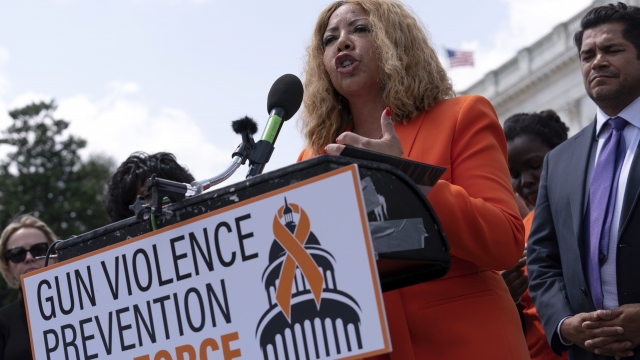The COVID-19 pandemic brought a rise in gun violence and homicides. For many cities, a post-COVID future means serious investments against violence from guns.
The hard part is figuring out how best to invest.
This past January, the New Orleans City Council met to discuss violent crime in a city with the highest rate of homicides in America. The meeting stretched six hours, nearly half of that time filled by comments from those tired of needing to make them.
"When you gotta go to a gas station with a gun on your hip," said one individual, "when you gotta go to the grocery store with a gun in your pocket — you're living in a war zone."
Calvin Pep hears comments like these every day.
Pep grew up in New Orleans' 7th Ward. He says he was abused as a child, did drugs at 9 years old, and was in and out of jail into his 20s. But because he made it through — because he made it out — he walks the ward every day trying to be a solitary solution to an inescapable problem.
"People see us," said Pep. "We can change our life. There are times that they know that we could have went backwards, but we didn't. That's what makes you credible."
For nearly a decade, Pep worked for the city as a "violence interrupter." He went street by street, meeting with residents, mediating interpersonal issues. He's part of a growing movement in American cities saying that in order to stop gun violence, you need to be in the community cutting off conflicts before they explode.
SEE MORE: White House to announce first-ever office of gun violence prevention
The movement has even reached the White House. This fall the Biden administration announced the first-ever White House Office of Gun Violence. Last fall it greenlit tens of millions of dollars toward community violence intervention, as research suggests it likely has an impact.
But for Pep, for New Orleans — the story gets messy.
"They came in and shut the program down," Pep said.
He left in 2020 when he says the city got too involved in the violence interrupter program. The program all but shuttered that year, just as homicides began to rise.
"If you are looking at the evidence, you can't say that this is a slam dunk," said Dr. Jennifer Avegno, New Orleans' director of health. She was at that council meeting in January. She says the New Orleans interrupter program stopped because of the arrival of COVID-19 and issues with infrastructure.
But, Avegno says, it can't be the only solution against gun violence.
"There was this idea that this was all you needed," Avegno said. "And I think we quickly found out that just doesn't make any sense. It's really unrealistic to ask the same 5-6 people to be on call 24/7 and to be in every neighborhood trying to mediate conflicts on the ground."
The city's current plan includes giveaways of biometric gun locks and a non-police-based 911 team. At that January meeting, the council voted for the Health Department to run a new intervention program based out of the hospital featuring hospital employees as interrupters.
"We know that one violent incident generally spawns multiple more," said Avegno, "So if you can interrupt the chain at any point, then the downstream effects are huge."
For cities and communities where gun violence is a constant thought, any solution that works in any way is welcome. Avegno says the street team will eventually come back. Pep isn't sure he'll rejoin. But he still walks his ward every day, knowing the frustration people feel, believing in the role he can play.
"We really stopped a lot of killing in this city," Pep said. "Some stuff, you can't stop. But I feel better knowing that I tried."
Trending stories at Scrippsnews.com




